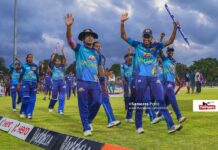A Chartered Chemist by profession, Dr. Ajith Perera is a qualified training instructor and a former test-match-panel Cricket Umpire. He sat down for an exclusive with ThePapare about his life experiences, cricketing know-how and much more.
Devoting his early life to academics, Dr. Ajith Perara was one of the privileged undergraduates to enter University of Colombo to major in analytical chemistry. However, parallel to his interest in chemistry he had a strong curiosity towards cricket from his schooling days at Royal College, Colombo. At the university Dr. Ajith decided to pursue his desire- cricket; he was playing for the Colombo University which back then was able to boast of an A division cricket team.
Being a cricketer in leisure time and as a chemical analyzer in academic life, he wanted to further analyze the rules and regulations of the game. In 1975, Dr. Perera decided to take an exam conducted by the Sri Lankan Cricket Umpire’s Association, in which he was one of the very few to make through the test. Having faith on his skills for umpiring Dr Ajith started umpiring as a part time job while he was studying for his post graduate at the Colombo University.

This gave him the idea that, though Sri Lankan Cricket was about to enter into international standards we were ages behind the techniques we use for scoring and umpiring. So he had an idea to build up the standards of cricket in Sri Lanka but it required more than theatrical knowledge. At the same time Dr. Perera got an amazing opportunity to gain the experience he was hunting for in Lancashire England. “I was truly privileged to witness such professional cricket. Cricket was famous throughout England but the essence of professional gaming was in the north. Most of all I was one of the first Sri Lankans to hit the Lancashire turfs; not even cricketers were that lucky” he remarks.
Dr. Ajith’s undying interests made him even further his skills while having the practical exposure. He was next gunning for umpire training; it was though notch to climb- the exam standards were harsh and hardly any South Asian had the courage to face an intense English panel of examiners on an English game. “It was a combination of teaching and presenting skills with your knowledge on the sport. How you direct your knowledge? How you conduct sessions, prepare for sessions? Tackling questions and calmness in certain situations” says Dr. Perera. “In 1990, I managed to make through the exams and was proud to get back to Sri Lanka”.

Unfortunately the significance of that day was not limited to most awaited happy news of his life, but the most chaotic as well. On the way back, after collecting the letter, Dr. Ajith’s vehicle met with an accident which paralyzed him for life. “The horror of that moment is inexplicable. I never knew it was the end of my umpiring career; all I expected was a small break till the next match. As sympathetic as it sounds I was cut off from my dream at the very moment I stepped into them” Dr. Ajith regretfully notes.
“But this wasn’t good enough to keep me away from my obsession over cricket. I was soon introduced to a device named ‘laptop’, common as it may sounds today; it was the most alien thing I’ve tried back then. This gave me the prospect of writing and noting down cricket related updates as I was bed resting” he says. “That was the time when Sri Lanka won the Cricket world cup –the golden era of cricket. I was watching every single match while I was resting; pre and post the world cup. We were winning every single one of them. Most importantly I was using the scoring techniques I learnt in England to keep track of match statistics. Back then the analysis of matches was difficult than ever without the use of computer so I was at a huge advantage” he further explains his efforts to contribute to the game.
No matter how limited he was, physically, Dr. Perara contributed to cricket by writing the book ‘Golden era of Cricket’ The book exclusively features all the matches played by the world cup winning cricket team , which Dr. Ajith himself has watched and scored. Also ‘Thinking Cricket’ published in 2001 by him was a famous read among cricket fans.
On present day cricket “We need to set back the winning vibe to the whole world. I’ve witnessed over three decades of Sri Lankan Cricket and umpired for most of the time. I’m convinced that back then the cricketers were in it solely for the passion and the ardor towards the game; cricketers were hardly well paid back then. Back then we’ve hardly heard about the facilities we have today- specialized coaches for batting, fielding, diet and etc. – yet we won the whole world ” Dr. Ajith stresses on the importance of getting the back on the lost focus. He believes today it’s not all about winning, because at times losing can be more lucrative. He adds “the involvement of money in the game results progress, but only to a certain extent, anything beyond this limit means temptation takes over your goal of winning”.
Finally he remarks that cricket is a game which requires lot of attention: The bowler decides how to take down a batsman in his head; the fielders have to stay on alert and most of all the batsman decides what stroke to play at the last minute. If anyone loses focus, it deviates the whole team from the common goal – winning the game. He notes that cricketers should leave aside the distractions in personal life and stay on the game for victory.
Today Dr. Ajith is a disability activist who believes in making the life easy for many other victims of unfortunate events like him. He has established professional developments outlines to avoided hazardous situations and to gain access for proper health care.
ThePapare.com was proud to encounter this courageous gentleman. We thank him for his time and wish him the very best in everything he sets out to do.

















